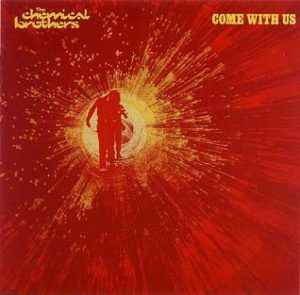Published on Mar 13, 2002
Unlike many artists of the big beat, techno or electronica
genre, the Chemical Brothers come off as more of an actual band as
opposed to bass-obsessed DJ’s who run amok on cutting-and-pasting
their sounds onto a track. Like some of the best bands in rock, the
Brothers thrive on dynamics. No wonder their seminal hit, “Block
Rockin’ Beats” has drawn comparisons to Led Zeppelin’s “Whole Lotta
Love.”
And like good artists in any genre, the Chemical Brothers have
usually placed a lot of faith in creating actual albums for
listening experiences. Albums meaning that you would feel guilty
for skipping a track, such as Nine Inch Nails’s
The Fragile. The Chemical Brothers latest album,
Come With Us, does not stray from other Chemical Brothers
albums. To a certain extent, it can be seen as the happy medium
between
Dig Your Own Hole and the psychedelic head-trip swirl of
Surrender. It starts off strong by grabbing your belt loops
and slamming you with the big beat blast of the title track. It
then goes into “It Began In Afrika,” a track that was
“accidentally” leaked to house DJs last fall. It’s silly, loud,
obnoxious and obviously, a hard-to-forget track.
Tom Rowlands and Ed Simons keep things rolling with the
head-nodding “Galaxy Bounce.” Then, “Star Guitar” showcases how the
evolution of The Chemical Brothers sound structures. It’s a
sophisticated track that has a tense, pulsating rhythm as a base
but incorporates much more delicate elements, such as a choir-like
chorus above the central beat.
And true to the form of many great album listening experiences,
some of the best material is saved for the last tracks. However,
this means that the middle of the album is saddled with some weaker
tunes. In the song, “The State We’re In,” Beth Orton contributes
her gorgeous vocals. The only problem is that the listener can’t
help but compare the track to the tracks where she sang on in
Exit Planet Dust and
Dig Your Own Hole. On “Where Do I Begin,” Orton sang the
chorus, “Where do I start/Where do I begin?” She was able to convey
confusion, longing and a dazed-morning after charm to the track. It
was one of the highlights on an album full of peaks. However, “The
State We’re In” does not have that same effect. It’s a nice song
and Orton’s vocals fit in perfectly, but the magic is lacking.
The same can’t be said for Richard Ashcroft. The former singer
of The Verve contributes to the final track, “The Test.” The
Chemical Brothers have had more collaborations than Santana, and
using Ashcroft put the Brothers in serious risk of turning this
practice into a parody. However, “The Test” is a great, energetic
track that serves as a great closer to
Come With Us. The beautiful tracks “Denmark” and “Pioneer
Skies” serve as a great setup for a closer and Ashcroft’s vocals
are enough to close the album on a high note.
Far from a landmark album,
Come With Us is still worth buying and an essential buy for
any Chemical Brothers fans. During a time when many record labels
dump their weakest material on the consumer,
Come With Us thankfully has enough roof-raising beats to
last the year. The album also grows with repeated listens.
Originally, I was going to give this album a B. However, many of
the songs linger in the listener’s mind, bringing them back to give
Come With Us a second chance and third. Strap on some
headphones and let it win you over.
